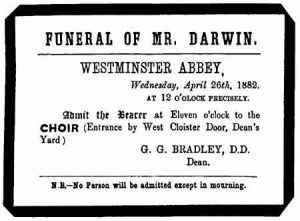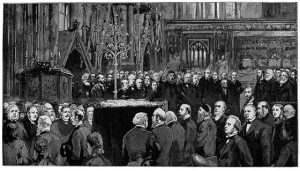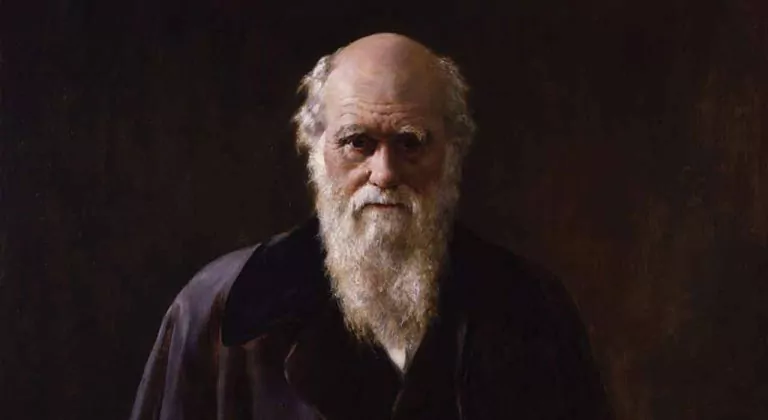One hundred and thirty-seven years ago, on April 19, 1882, a seventy-three-year-old man died at home in his bed. He was surrounded by his wife and two of his children, all three of whom wept inconsolably. His wife, who had held him against herself the last moments of his earthly strife, gently lowered him onto the bed. She stroked the white beard and closed the glazed eyes.
Even though the family sorrowed, there was also a sense of relief that the patient had finally succumbed to death. The last few weeks had been difficult. Angina attacks precipitated fear. He had refused to eat with his family, preferring to eat in his bedroom alone. He had observed his body with morbid interest, taking notes on what he saw. “Much pain,” he would jot down, or scratch out “dropped down,” after he succumbed to faints.
Tuesday, April 18, 1882, was his penultimate day and the pain began just before midnight. He woke his wife, to tell her that he was dying and she ran for his pills. Together with a servant she also administered brandy. But he was unable to keep it down, and retched miserably. He slept a little but vomited throughout most of the next morning, his body heaving and shuddering in agony.
“If I could but die,” he said repeatedly, intent on present escape and not focused on the fact that he would shortly face the Creator of his heart, the Judge of his soul. He vomited again and blood spewed out, spilling red onto his white and venerable looking beard. “Oh, God,” he cried, and again, “Oh, Lord God.” His pain appeared to be excruciating and lasted until he lost consciousness about a half-hour before he died. And Charles Darwin was no more on the earth he had with human textbook clarity consigned to evolutionary origins.
*****
Charles Darwin, (1809-1882), was the youngest son of an English doctor – one who did not believe in God. His paternal grandfather, an Erasmus Darwin, was also a doctor and an atheist – one who believed in the natural ascent of life and in the kinship of all creatures. Young Charles liked the outdoors. He reveled in collecting shells and bird eggs. Although his father wanted him to become a doctor, like himself and his father before him, Charles had no interest in following their footsteps. He dropped out of medical school, studied theology for a while, and then went on to become a naturalist.
In 1831, when Charles was 22, he was hired as a naturalist aboard a ship called the Beagle and left England for a five-year excursion around the world. During this trip, Darwin was particularly intrigued by the plants and animals on the Galapagos Islands, several hundred miles off the west coast of South America.
Darwin’s conclusions at the end of this trip are well known and have had repercussions around the world. He inferred that all species – the entire plant and animal kingdom – resulted from environmental adaptations over millions of years. In other words, God did not create the world in six days, but the world was the product of millions of years of evolution. In 1859, Darwin published these conclusions in a book entitled, The Origin of Species.
The fact that Darwin stated God did not create things but that they arose through natural processes, and the fact that he promoted the existence of the universe as an accident with no purpose, were both in direct conflict with the Word of God.
*****
Darwin had expressed the wish to be buried in the churchyard in the village of Downe, some sixteen miles south of London, where he had lived and worked most of his married life. He wanted his grave to be next to the graves of three of his children under a great yew tree. But such was the mood of the day – that a fool without clothes could be held up as a king – that one who openly flouted God could be hailed as a saint.
Freethinking friends, wanting to honor the dead atheist, presented the Dean of Westminster with the request that Charles Darwin be buried within that church. Petitions went around and many influential government people signed, indicating that they thought Darwin’s last resting place should be one of glory among other English patriots. The Standard, a newspaper, urging the family to comply with popular feeling, wrote:
“Darwin died as he had lived, in the quiet retirement of the country home which he loved; and the sylvan scenes amidst which he found the simple plants and animals that enabled him to solve the great enigma of the Origin of Species may seem, perhaps to many of his friends, the fittest surroundings for his last resting place.
“But one who has brought such honor to the English name, and whose death is lamented throughout the civilized world, to the temporary neglect of the many burning political and social questions of the day, should not be laid in a comparatively obscure grave. His proper place is amongst those other worthies whose reputations are landmarks in the people’s history, and if it should not clash with his own expressed wishes, or the pious feelings of the family, we owe it to posterity to place his remains in Westminster Abbey, among the illustrious dead who make that noble fame unrivaled in the world.”[1]
 Darwin was compared with Newton, foreign tributes to him poured in and in the end the Dean of Westminster acquiesced to the request that the body be laid to rest in the Abbey. Undertakers dispensed tickets of admission to the widely advertised funeral and an expensive coffin was sent to Downe for the body’s repose.
Darwin was compared with Newton, foreign tributes to him poured in and in the end the Dean of Westminster acquiesced to the request that the body be laid to rest in the Abbey. Undertakers dispensed tickets of admission to the widely advertised funeral and an expensive coffin was sent to Downe for the body’s repose.
No newspaper paused to consider the fact that burial at Westminster might present a religious obstacle. The Standard said: “True Christians can accept the main scientific facts of Evolution just as they do of Astronomy and Geology, without any prejudice to more ancient and cherished beliefs.”[2]
The Daily News stated: “…. Darwin’s doctrine was quite consistent with strong religious faith and hope.”
It wasn’t just the newspapers which blew Darwin’s trumpet. Ministers praised the dead man as well. Canon Prothero, Queen Victoria’s chaplain, said on the pulpit, that Darwin had pursued the truth and in him had lived “… that charity which is the essence of the true spirit of Christ.”[3] The canon at Westminster Abbey, an Alfred Barry, echoed the queen’s chaplain’s sentiment by saying that Darwin’s theory of natural selection was “by no means alien to the Christian religion.”[4] At St. Paul’s Cathedral in London, another minister lauded Darwin for the patience and care in which he had recorded minute facts. In this way he had brought about a revolution in modern thought and shed high distinction on English science.[5]
The funeral was not attended by either Queen Victoria or Gladstone, her Prime Minister. Neither had expressed an appreciation for Origin of Species. But thousands of others did attend. Judges, Parliament members, the Lord Mayor of London, ambassadors, scientists and a great many people from the ordinary homes and hearths of London. Multitudes entered the Abbey, all handing in their funeral tickets at the door. After these had all settled in their pews, the doors opened to those who had no tickets. These people filled the less desirable seats in the northwest side of the Abbey.
At noon Canon Prothero entered with the choir as they jubilantly sang “I am the resurrection.” The family, flanking the coffin, which was draped in black velvet and covered with white blossoms, followed. A specially composed hymn was sung after a Bible lesson. The words of the hymn came from Proverbs: “Blessed is the man that findeth wisdom, and getteth understanding.”

Darwin’s funeral service
It is not entirely strange to suppose that the devil occupied one of the pews of Westminster that day. He for one was well aware that Darwin had said, “If God had planted the knowledge of His existence in humans, all would possess it.”[6] He also knew Darwin had said that “the plain language of the New Testament seems to show that the men who do not believe, and this would include my father, brother and almost all my best friends, will be everlastingly punished. And this is a damnable doctrine.”[7] And the devil must have slapped his knees in mirth thinking about Darwin’s public confession: “I am sorry to have to inform you that I do not believe in the Bible as a divine revelation, and therefore not in Jesus Christ as the Son of God.”[8]
In the end, Darwin’s coffin was lowered underneath Newton’s monument as the choir rendered another selection, “His body is buried in peace, but his name liveth evermore.” People were awed at the solemnity of the moment. The mourners filed out. Darwin had been interred as a symbol of English success in the field of science – that is to say, he had put forward the thought that man was just an animal – an accident of cosmic evolution with no ultimate purpose.
*****
Society would never be the same. Although Darwin only put a framework to what many people were already thinking, and to what itching ears were desirous of hearing, the consequences of what he contributed were severe.
Racism was rampant in the thinking among early evolutionists. Ernst Haeckel, (1834-1919), the great proponent of Darwin’s theory in Germany, wrote:
“The mental life of savages rises little above that of the higher mammals, especially the apes, with which they are genealogically connected… Their intelligence moves within the narrowest bounds, and one can no more (or no less) speak of their reason than of that of the more intelligent animals… These lower races (such as the Veddahs or Australian negroes) are psychologically nearer to the mammals (apes or dogs) than to civilized Europeans; we must, therefore, assign a totally different value to their lives.”[9]
The idea that white people were superior led to the practice of eugenics – a campaign to improve humankind through selective breeding. James Perloff, in his book Tornado in a Junkyard, writes:
“…In Britain, Charles Darwin’s son Leonard became president of the Eugenics Education Society. In the U.S., the movement caught fire in the early twentieth century. By 1935, 35 states had enacted laws requiring the sexual isolation and sterilization of ‘unfit’ people – including the retarded, the ‘feeble-minded’, chronic criminals, and even epileptics. Proposed legislation targeted tuberculosis sufferers, alcoholics, the blind and homeless. About 70,000 Americans were involuntarily sterilized before the practice was stopped.”[10]
Nietzsche, (1844-1900), was influenced by Darwin’s theory. He denounced Christianity and declared: “God is dead.” He then advanced the idea of the “superman” and a “master race.” This idea was taken over by Hitler, (1889-1945), who consequently killed his millions insanely believing that Darwin’s theory of evolution justified and sanctified his cruel actions.
Hitler was not the only madman Darwin influenced. Karl Marx, (1818-1883), viewed Darwin’s work as a basis in natural science for the class struggle throughout history.[11] He actually wanted to dedicate his Communist book, Das Kapital, to Darwin, but Darwin refused the “honor.”
Stalin, (1879-1953), as well, who began his studies as a theology student, changed his thinking after he was exposed to the theory of evolution. In a book, published in 1940, Landmarks in the Life of Stalin, this change is recorded by the author Yaroslavsky in these words:
‘“At a very early age, while still a pupil in the ecclesiastical school, Comrade Stalin developed a critical mind and revolutionary sentiments. He began to read Darwin and became an atheist. G. Glurdjidze, a boyhood friend of Stalin’s relates:
“I began to speak of God. Joseph heard me out, and after a moment’s silence said: ‘You know they are fooling us, there is no God…’
“I was astonished at these words. I had never heard anything like it before. ‘How can you say so, SoSo?’ I exclaimed.
“‘I’ll lend you a book to read; it will show you that the world and all living things are quite different from what you imagine, and all this talk about God is sheer nonsense,’ Joseph said.
“‘What book is that?’ I enquired.
“‘Darwin, You must read it,’ Joseph impressed on me.’”[12]
Joseph Stalin also killed his millions.
The Chinese leader, Mao Tse-tung, (1893-1976), regarded Darwin as a teaching influence in his life. Calling Darwin the founder of Chinese scientific socialism, Mao was responsible for the death of millions of people.
Andrew Carnegie, (1835-1919), and John D. Rockefeller, (1839-1937), were also Darwinists. They were both ruthless businessmen who practiced “survival of the fittest” in their business dealings. Carnegie said:
“When I, along with three or four of my boon companions, was in this stage of doubt about theology, including the supernatural element, and indeed the whole scheme of salvation through vicarious atonement and all the fabric built upon it, I came fortunately upon Darwin’s and Spencer’s works… I remember that light came as a flood and all was clear. Not only had I got rid of theology and the supernatural, but I had found the truth of evolution. ‘All is well since all grows better’ became my motto, my true source of comfort.”[13]
Rockefeller financed the preaching of Harry Emerson Fosdick’s radio ministry. He brazenly accepted evolution and downgraded the Bible into mythology.[14]
*****
So Charles Darwin rests beneath the cold cement of Westminster Abbey. Or does he? Is his eternal soul at peace? Well aware of the tenets of Christianity, he knew that his ideas would destroy the faith of millions. He referred to Origin of Species as “my accursed book.” There was considerable trauma associated with his writing of the final draft. In the year leading up to publication he was rarely able to write for more than 20 minutes at a time without stomach pains, and he finished the proof on October 1, 1859, in between fits of vomiting.[15]
Ten days before the proofs were bound he wrote to his friend J.D. Hooker,
“I have been very bad lately; having had an awful ‘crisis’ one leg swelled like elephantiasis – eyes almost closed up – covered with a rash and fiery boils: but they tell me it will surely do me much good. – it was like living in Hell!”
His modern biographers talk of Darwin’s self-doubt, his nagging, gnawing fear that “I … have devoted my life to a phantasy.”[16] It is not surprising that Darwin was subject to a “gnawing” fear nor the fact that he admitted that, in the dead of night, terror would strike him with painful force when he thought of the possibility of an afterlife. And so his body lies in Westminster Abbey – a grave mistake – an unwise decision.
And what, after all, is true wisdom? Is it not the fear of the Lord? May God grant that the eyes of many hearts may be enlightened. Let voices not be afraid to cry out loudly without fear that evolution is a hoax and that it literally hasn’t got a leg to stand on. Edmund Clowney’s hymn, “Vast the Immensity” is a witness to God’s wisdom and creation.
Vast the immensity, mirror of majesty,
Galaxies spread in a curtain of light:
Lord, Your eternity rises in mystery
There where no eye can see, infinite height!
Sounds Your creative word, forming both star and bird,
Shaping the cosmos to win Your delight;
Order from chaos springs, form that your wisdom brings,
Guiding created things, infinite might!
Who can Your wisdom scan? Who comprehend Your plan?
How can the mind of man Your truth embrace?
Here does Your Word disclose more than Your power shows,
Love that to Calv’ry goes, infinite grace!
Triune Your majesty, triune Your love to me,
Fixed from eternity in heav’n above.
Father, what mystery, in Your infinity
You gave Your Son for me, infinite love!
END NOTES
1 Desmond and Moore, The Life of a Tormented Evolutionist, Warner Books,1991, page 668.
2 Ibid, page 670
3 Ibid, page 671
4 Ibid.
5 Ibid.
6 Ibid, page 251.
7 Ibid, page 623.
8 Ibid, page 634-5.
9 Perloff, Tornado in a Junkyard, Refuge Books, 1999, page 220.
10 Ibid, page 221.
11 bid, page 225.
12 Ibid.
13 Ibid, page 226.
14 Ibid.
15 Creation, Ex Nihilo, Vol. 17 No 4. September-November 1995, ‘Darwin’s Mystery Illness, by Russell Grigg, page 29.
16 Ibid.












